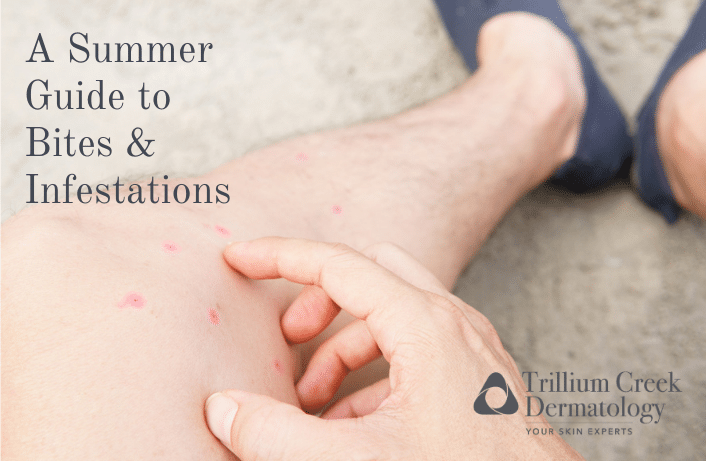
The summer sunshine and warm breezes bring the inevitable insect bites.
Many of the bites although annoying fade after a few days, but there are a few types of bites that can lead to something more serious and should be examined by a dermatologist as soon as possible. Here is a list of bites you can deal with yourself, and which you may need professional treatment for.
Mosquito Bites
The epitome of summer-time biters, mosquitos are more than just annoying, they can also be dangerous. Any insect that feeds on blood can carry parasites, viruses, and harmful bacteria that cause all kinds of diseases in humans, from dengue fever to Zika.
Mosquito bites can cause allergic reactions, including hives, blisters, and swelling around the area. You should see a doctor if these symptoms or others like fever, aches, vomiting, or difficulty breathing occur after being bitten by a mosquito.
Spider Bites
Although it may seem highly dangerous, being bitten by a spider probably won’t be too serious an issue (and you certainly won’t gain any superpowers). The only spiders that are potentially dangerous to people in the US are the brown recluse and black widow spiders, both of which are very rare.
To treat spider bites, wash the area with soap and water, apply a topical antibiotic ointment like Neosporin, and apply a cold pack to help with any swelling. Taking oral medications like painkillers and antihistamines can help with more painful bites.
Fly Bites
Although a rare circumstance, getting bitten by a fly like the horse or deer fly can really hurt. Fly pincers are shaped like scissors, and they work like them too. Fortunately, they don’t carry any venom, although some people can have an allergic reaction to their saliva. You can typically treat fly bites with painkillers and/or antihistamines, however, Trillium Creek dermatologists can recommend the best-quality lotions and creams to treat fly bite symptoms.
Flea Bites
Fleas aren’t just a nuisance for your pets, they can also jump to you and cause itchy patches where they bite. Though usually harmless, people who are allergic to flea bites may experience breathing problems, and bites that become infected may swell up with pus.
Ant Bites
Usually the cause of panic at a picnic, ants aren’t known for their bites, but the right type of ant can really pack a punch. Fire and bullet ants are famously the worst offenders, but unless the bites trigger an allergic response and you feel your throat swell or have trouble breathing, you can treat the bites with soap and water and treat the pain with hydrocortisone cream. For more serious reactions, allergic or otherwise, seek medical care right away.
Bed Bug Bites
A bed bug infestation is a nightmare for hotel guests and apartment renters, as the nocturnal habits of these crawlers can largely go unnoticed, even if they bite during the night. This is because bed bugs inject an anesthetic to dampen the appearance and feel of their bites.
You may never see or feel a bed bug bite, but when you do, the bite itself is easily treatable with anti-itch cream and antiseptic gels. The infestation, on the other hand, may require more drastic measures. And if you ever have trouble breathing or experience any other allergic responses with an unknown cause, consult your doctor.
Tick Bites
The bane of hikers everywhere, ticks are stubborn insects that rival mosquitos in their ability to spread diseases like West Nile virus and Lyme disease. Because ticks hang out on the leaves of plants, waiting to cling to passing prey, their bites usually appear wherever they first find skin—for humans, typically around the legs and face.
Prescription antibiotics are typically needed to properly treat a tick bite, which can induce flu-like symptoms. When you first notice you have one (or several), wash the affected area with soap and water to remove any lingering ticks. Then call your doctor or a certified dermatologist to get an antibiotic prescription and to remove the tick.
Chigger Bites
Like ticks, chiggers are typically hidden in vegetation and bite around the legs or waist. The bites, while not usually painful, do itch for several days or weeks. After washing the area with soap and water, an anti-itch lotion should relieve the annoying itching sensation, although a dermatologist may be able to recommend a medical-grade ointment to relieve the stubborn symptoms of a chigger bite.
Bee Stings
Finally, while not technically bites per se, bee stings can cause serious allergic reactions that need immediate medical attention. For treatment, whether you know you’re allergic to bee stings or not, wash the area thoroughly with soap and water and remove the stinger if necessary. Then, if you develop any allergic responses, make sure to call or visit a doctor as soon as possible.
If no immediate reaction takes place, a bee sting can cause swelling and itching that can last any number of days. For quick, medical treatment of bee sting symptoms, call the Trillium Creek dermatologists, who can recommend a personalized, professional treatment plan for bee stings.
Ohio Dermatologists Ready for You
The Trillium Creek dermatology team is here to help with your every skincare need. From bites and infestations to skin cancer, our team is trained and equipped to provide the highest caliber of treatment in northeast Ohio. Call your nearby treatment center or schedule an appointment online to get the conversation started about your skincare needs.

